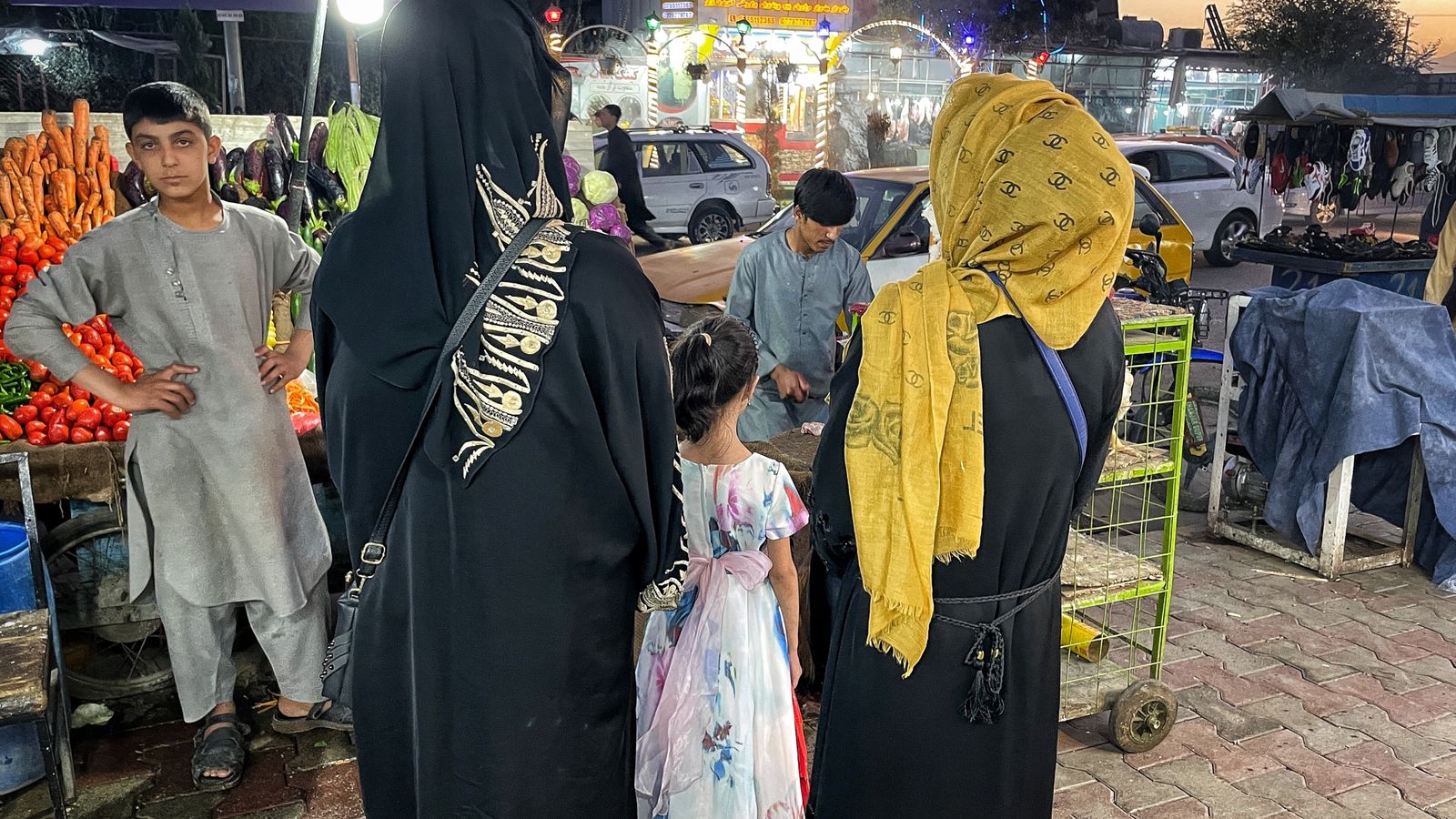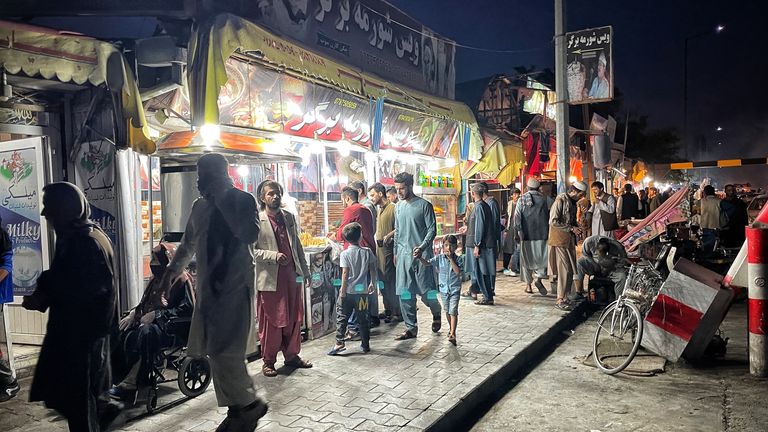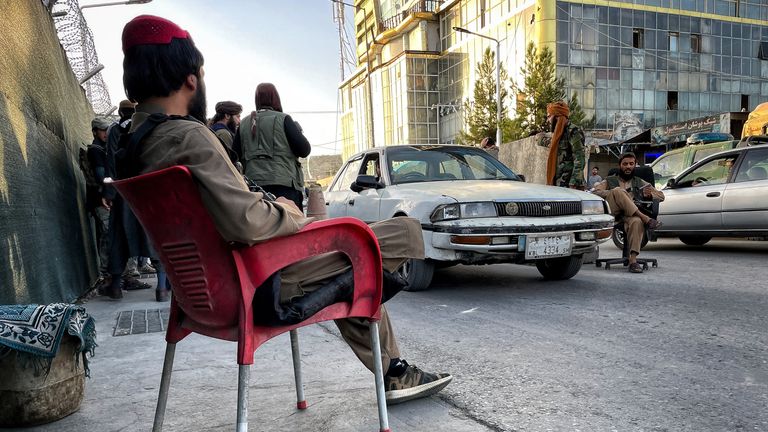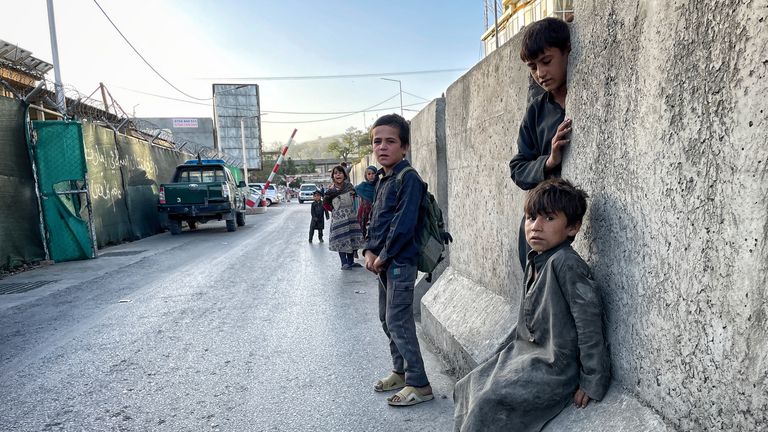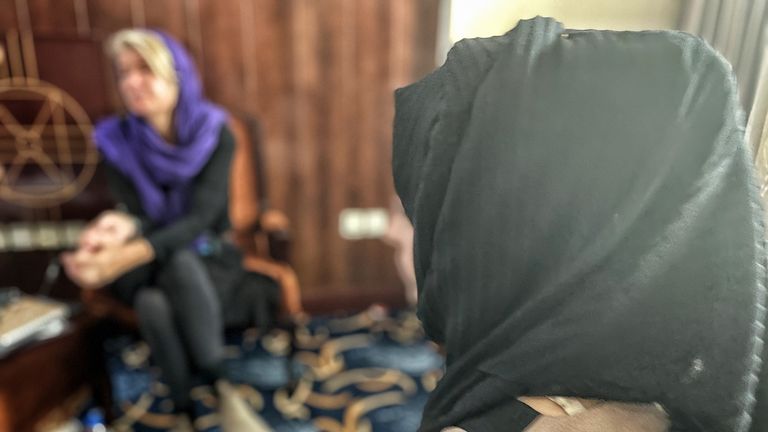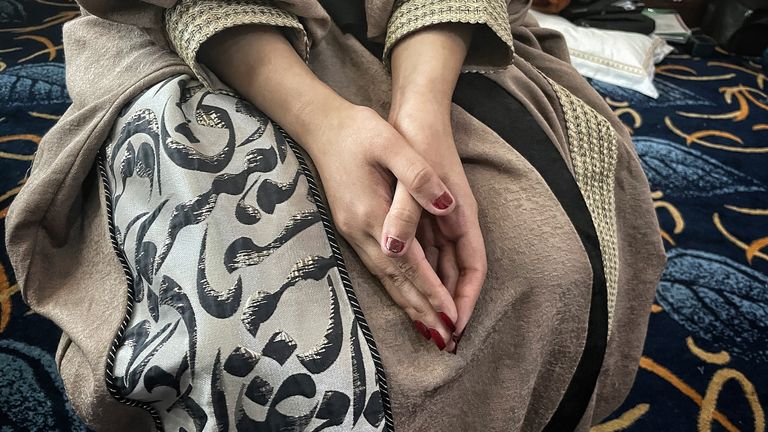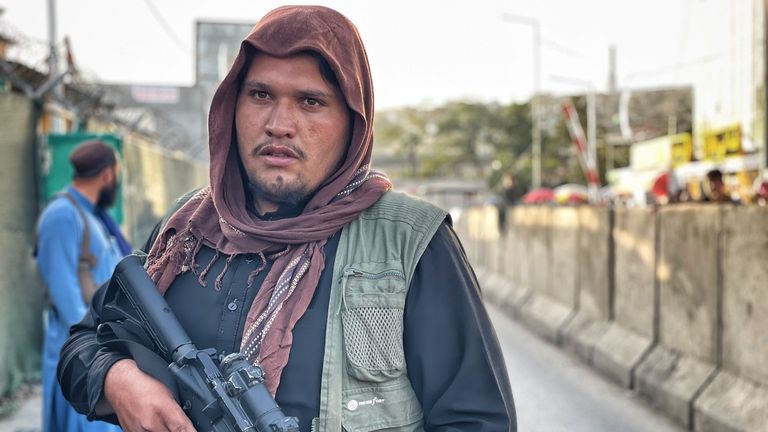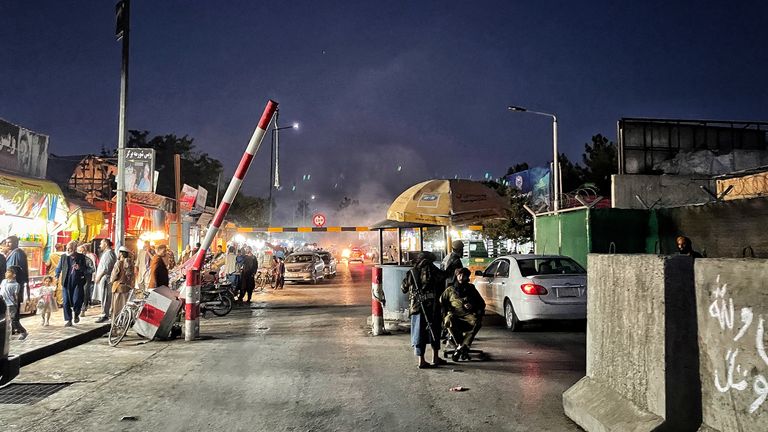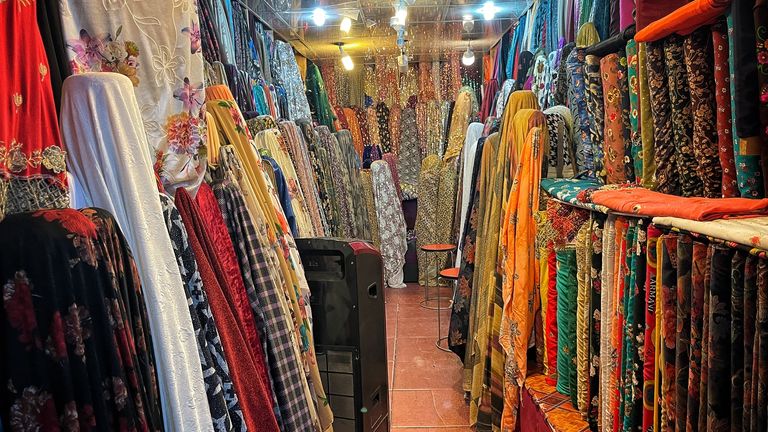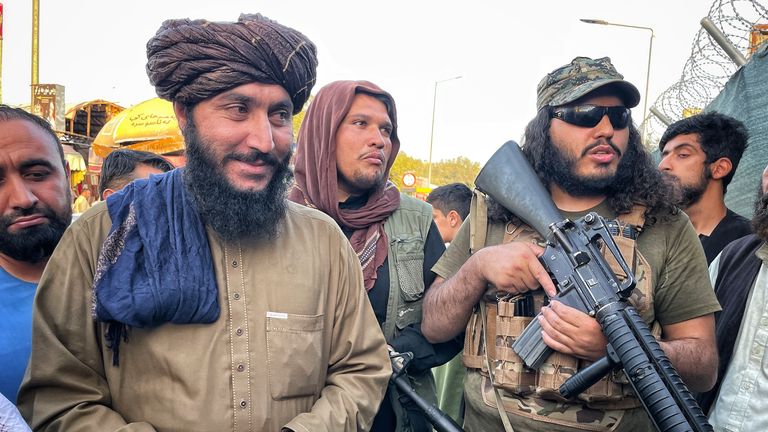Many of the women of Afghanistan are frightened right now. And those who worked for the foreigners who’ve pulled out of the country, are even more so.
They are some of the top Taliban targets and too many of them are telling us how the Taliban are going from door to door, trying to find those who once worked for the “enemies”.
Officially, there’s an amnesty. Unofficially, there are scores being settled and intimidation is rife.
“Why did I work for the US?” one 24-year-old woman asks us.
“That [when we are in] such a situation they are not responding us (sic)… not hearing us? It’s a waste of my work experience, all those years. It’s a waste of effort, it’s a waste of struggle, it’s a waste of everything right now. I even carry some kind of hate in my heart for them.”
She and her sister have travelled with their uncle to where we are staying. They were too scared to talk to us openly.
They saw us filming in a market in the capital and the younger sister (who we will call “Tabasum” for her safety), tells us she watched us for two hours before summoning up the courage to pull Sky producer Chris Cunningham to one side.
“Please, I want you to interview me,” she told him. “I can’t talk here because our lives are in danger.”
It has taken tremendous bravery to speak up at all. We are just a few metres away from an armed Taliban checkpoint. The fighters who are patrolling through the market, with weapons slung over their shoulders, tell us how we are seeing a different, better side of Kabul.
“A few weeks ago you would not have been able to come here because of the security,” the Talib tells us. There appears to be no irony in his voice.
There are many more people out in the market than we’ve seen in the previous few days. And there is a marked increase in the number of women in public.
Initially, the Taliban instructed women to stay indoors “for security reasons”. But while we are here there are many thronging the stalls.
We notice they are all wearing long flowing dresses or coats and headscarves or hijabs – a number are in the all-enveloping burka. Many appear to have a male companion (mahram) shepherding the groups of females around.
We ask the Taliban commander manning the checkpoint what he does to enforce any dress code. He replies that so long as the women adhere to Sharia law, there’s no issue.
Another Talib interrupts. “It’s an Islamic society,” he says. “And there is no need to tell them to wear hijab, we haven’t had to ask them…everyone is obeying that now.”
When you’re the ones holding the guns, perhaps you don’t need to persuade too hard.
In the room where we are secretly meeting the young women, they spread out their paperwork which shows extensive links with USAID and other foreign aid groups like CARE, which has a base in Britain.
There are 25 members of their extended family with eight of them children. Almost all of the adults used to work for foreign aid groups or they are female teachers, now in danger.
The young women’s mother is a principal at a girls’ high school.
“Look at this death threat she received from the Taliban,” Murro shows us. She flicks through her phone to find the scrawled letter from the Taliban which was investigated and verified by the previous administration.
The letter says: “Our main aim and work is to kill all students, teachers and the principal.”
They talk about their mother opening the door to their home a few days after Kabul fell to the Islamist group to find a gaggle of armed Taliban outside.
“They just demanded food and came in,” Tabasum says. “I was standing in my bedroom just shaking. I could not believe it.”
The Taliban fighters began to regularly march into the house demanding food, or tea and asking questions about who they worked for.
“Did you work for the old government,” one Talib asked them. “There are rumours you worked for the foreigners…”
“We decided we needed to move then,” Tabasum says. They’ve been on the run ever since.
They show us photographs with the former US first lady Laura Bush taken in Washington DC. There are others standing proudly with British soldiers.
“We love our country. We were proud to work for Afghanistan and build a new future,” says 24-year-old Murro. “I empowered 900 women during my career with USAID. Now what am I? I am not empowered. I am told I cannot work and I’m told how to dress.
“I worry about the future, not just my future but my family’s future and the country’s future. Have you ever felt you are living in a country that is not your country anymore? That’s how I feel right now.”
They tell us of how the friends and partners they worked with for years have now turned their backs on them. How none of their emails and applications for asylum are being answered or even responded to.
WhatsApps go unread, calls are not picked up.
Tabasum was one day away from finishing her business degree. She was due to complete her thesis at one of Kabul’s top universities on Monday.
The airport suicide bombing which killed nearly two hundred including 13 US service personnel happened on the Sunday before.
“In one day, my life changed. All the lecturers left the country. The university is now empty. All four years of my studying is wasted.”
She had a job but her superiors rang her up and told her it wasn’t safe for her to come in as a woman and that she should stay at home. Almost half the staff were women, now all sitting at home.
“They don’t want me because I’m a girl,” Tabasum says. “I don’t have the right to come out of my home now without a male. Why? Because this is an inequality. I don’t have the same rights as a boy. I am nothing for them.”
“I have become invisible. I used to have a job. I am educated. I don’t need any man. But now I am just nothing.”
She’s wearing a full-length coat and black hijab. “Before I never wore a hijab,” she says. “I wore T-shirt and jeans. Now I can’t go anywhere without covering my head and wearing these clothes.”
Despite all the reassurances from the Taliban that they respect women’s rights, the women of Afghanistan do not believe them.
And the Taliban are dealing with a tougher, better educated, more liberal Afghan woman now – many of them in their 20s or 30s.
They have aspirations and educated minds which has put fire in their stomachs and sent courage soaring through their veins. We’ve seen them take to the streets to fight for their rights – and not back down even when staring down the barrel of a gun.
The Taliban fighters may be manning the checkpoints and prowling the area with guns but the Afghan women are not prepared to return to the times their mothers endured.
We set out to meet a female activist and mother of three who we interviewed before the Taliban took control. We will call her “Fatima”.
She also worked for a series of foreign NGO’s focused on running female empowerment courses and skill projects for women.
She too received written death threats from the Taliban as well as threatening texts and frightening phone calls.
She told us weeks before the Taliban marched into the capital that she was in fear of her life and was terrified her three young children were going to be harmed as the Taliban had warned of killing her whole family.
She’d taken refuge in a women’s shelter then. Since then even that’s not safe. The Taliban have moved in and she’s moving constantly now with her family from friends’ home to friends’ home.
She was cleared to be evacuated by the British military and received a confirmation email but hours later got another warning her not to travel to the airport or the Baron Hotel because of a precise security threat which turned out to be the suicide bomber who blew himself up the following day.
Since then she’s been getting increasingly desperate as evacuation flights have been halted.
Those left behind who did so much service for Afghanistan and worked with such faith with the foreign partners, they never expected to leave so hurriedly, are feeling forgotten and in many ways betrayed.
“I prefer to die at sea at the hands of human traffickers trying to escape here than be killed by the Taliban,” Fatima tells us. “But I’m a prisoner here right now.”
